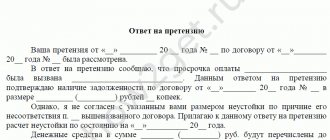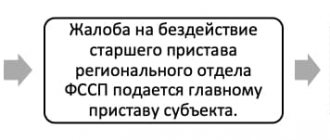Apartment debt appears for various reasons. Dismissal from work, health problems, the number of unpaid receipts from utility companies is growing. But resource suppliers have the right to demand payment for the supplied gas, heat, electricity, and therefore a court order is issued to collect utility bills.
In this case, debt collection is permitted through the courts. The law establishes two procedural procedures for claiming rent arrears: writ or lawsuit proceedings.
To understand what to do in each situation, legal knowledge is necessary - without the help of a competent lawyer, it is difficult to follow the procedure for filing a claim to recover a debt.
Writ proceedings - legal aspects
Collection of debt for utility bills, a court order is a simple and quick way to claim a monetary debt in the amount of up to five hundred thousand rubles.
This requires certain conditions:
- The indisputable nature of the recovery. He assumes that the debt arose on the basis of documentary evidence; its size can be proven with the help of papers.
- A request to the court is included in the list of requirements for which creditors have the right to receive an act of justice under a simplified procedure.
Receiving a court order for the collection of utility bills has the nature of a writ of execution, so it is easier to obtain and execute. It is issued without court hearings or calling the parties. Its issuance is intended to reduce the burden on district and magistrate courts and speed up the process of satisfying the monetary claims of applicants.
When and by whom is it written?
An objection to the application for debt collection must be written and submitted by the debtor to the court in which the case was heard within 10 days (Article 128 of the Code of Civil Procedure of the Russian Federation). The report begins from the moment the owner receives the certified letter from the court.
If the order is not contested within 10 days, the document comes into force. This means that you will have to deal with bailiffs in the future. Their task is to fulfill the demands of the claimant.
During enforcement proceedings, the debtor also has the right to appeal the order, but to do this he will need to file a petition with the court to restore the period for challenging
In addition, he must provide evidence of valid reasons why he was unable to file an objection within the period prescribed by law.
Form of a court order for the collection of utility bills
Collection of utility payments by court order occurs in such a way that the resource supplier organization (energy supply organization, HOA, management company) submits an application for the issuance of an order.
It states:
- Information about the court that is authorized to issue it.
- Data of the parties to summary proceedings.
- The circumstances of the claimant obtaining the right to recover the debt through the court, and their evidence.
- Papers confirming the authority to demand repayment of the debt.
- List of attached documentation.
The issuance of a court order for the collection of utility bills is subject to a state duty. Its size is less than the amount established by tax legal norms (Article 333.19 of the Russian Tax Code).
An application is submitted either to the magistrate (if the amount of debt is within fifty thousand rubles) or to the district judge (if demanding money in the amount of fifty-one thousand) at the place of registration of the debtor.
Example
For clarity, here is an example of writing an objection to a court order.
Magistrate of the judicial district No. 2 of the Leninsky district of Krasnodar Emelin E.V. Address: Krasnodar, st. Proletarskaya, 54.
from Sergei Viktorovich Mitroshin address: Krasnodar, st. Vostochnaya, 8, apt. 1. court order No. 342.
Objection to a court order
Magistrate Emelin E.V. judicial district No. 2 of the Leninsky district of the city of Krasnodar on August 12, 2017, court order No. 342 was issued on an application from Zhilstroy LLC to collect arrears in payment for utilities and state duty in the amount of 61,200 rubles from Sergei Viktorovich Mitroshin.
Debt in payment of utility bills – 60,000 rubles. The cost of paying the state fee is 1200 rubles.
The court order was received by Sergei Viktorovich Mitroshin on August 19, 2017, which is confirmed by the mark on the postal envelope in the case materials.
With this statement, Sergey Viktorovich Mitroshin objects to the execution of court order No. 342, due to the fact that the utility debt has been fully paid.
In accordance with Art. 129 of the Code of Civil Procedure of the Russian Federation, the order is canceled if an objection is received from the debtor within the prescribed period. Guided by Art. 129 Code of Civil Procedure of the Russian Federation, please:
cancel the court order No. 342, issued by the magistrate of the court district No. 2 of the Leninsky district of the city of Krasnodar E.V. Emelin dated 08/12/2017. Application:
a copy of the court order; copies of receipts for payment of utility bills. Date: 08/20/2017, Mitroshin S.V. (signature).
Possibility of canceling a court order
The issuance of a court order for the collection of utility bills can be canceled in two ways:
- By filing an objection to its execution.
- Appeal to a higher court.
The first reason for canceling this document implies that the debtor has arguments against fulfilling the requirements established by the judge. When demanding payment for housing and communal services, this is a disagreement with the tariffs, a reference to the lack of authority of the claimant to receive money.
Objections must be made in writing and must be submitted within ten days after receiving a copy of such a document.
If arguments are received, then the judge (who issued the paper) issues a ruling to cancel the results of the writ proceedings in the case, and indicates the creditor’s right to demand payment for consumed utility resources by filing a claim in court.
The second way is to file a complaint against an act of justice passed without trial. In this case, the higher authority will cancel the order as a normal decision. This procedure begins with the consideration of a dispute, so it is more complicated and will require more time (especially if you need a form of a court order for the collection of utility bills).
Obtaining or canceling a court order to collect utility bills is complex and requires special knowledge. In order not to delay the matter, you should contact a competent lawyer who will analyze the documents and help you find a solution to your financial problems.
Grounds for preparing an objection to a court decision
The registration of a court order differs from classic lawsuit proceedings in that a tenant who does not pay for utilities is not notified in advance that they want to initiate a case against him and forcibly collect funds. The circumstances become known only after a court order is sent to him, on the basis of which the debt will be collected. At the same time, the document states that in a situation where a person does not voluntarily provide funds, collection will be carried out by bailiffs. They demand the amount forcibly.
Video
The periods during which cancellation is permissible are strictly defined by current legislation. You can go to court within just 10 days. In another situation, the order will be carried out. When challenging an act, you can identify the reasons that led to the need to perform such an action. The first reason is the debtor’s disagreement with the amount to be collected. In this situation, it is recommended to independently calculate the debt, indicate the corresponding calculations, providing links to payment documents that demonstrate payment of part of the debt amount or funds in full.
Important! All receipts must be retained. This is the only way to prove that you are right. The limitation period is 3 years. During this period, payment documentation must be retained.
Another reason is doubts about the legality of the order or the collection of debt outside the statute of limitations. Additionally, you can demand cancellation of the document if it does not comply with the current legislation. The requirements for the order are reflected in Article 124 of the Code of Civil Procedure of the Russian Federation.
Video
Actions of the defaulter to repay the debt
It says that the debtor must put the received document into effect within five working days, that is, pay the debts. Do not ignore the order under any circumstances. Take care of your financial condition and avoid huge fines.
Sometimes it happens that the defaulter, for some objective reason, does not repay the debts. According to the law, he has the right to a deferment. But to do this, you must immediately, after receiving a copy of the order, contact the FSSP to write an application. The reason for the inability to pay the debt must be documented. A certificate of long-term treatment and checks confirming expenses for it, or a work book with a record of recent dismissal, are suitable for this.
This is also important to know:
How to draw up an objection to a statement of claim for debt collection on a loan: sample document
In this situation, by mutual agreement, a debt repayment schedule will be drawn up. If the defaulter has not done any of the above, bailiffs will take over the case.
Consequences of the entry into force of a court decision
The management company must also provide justification for issuing the document.
However, it is easier for the creditor to do this, since a statement is sufficient, which indicates:
- name of the court;
- information about the organization;
- debtor data;
- history of the debt and its relevance - attached documents;
- an agreement with a housing and communal services company, which allows you to demand payment.
If doubts arise regarding the license to operate a management company, the court may return the application, in accordance with Art. 125 Code of Civil Procedure of Russia.
If all the necessary papers are available, then a fairly small number of receipts for the latest billing periods. The court order is issued in 2 copies. The first is handed over to the plaintiff, a copy is sent to the debtor in the form of a notice. The second one is certified by the official seal and sent to the local bailiff department.
This gives FSSP employees the right to:
- seize property owned by the defaulter, including real estate;
- initiate blocking of bank accounts - withdrawing money from them will be prohibited, funds will be written off to pay off the debt;
- limit travel abroad.
Execution of measures involves full collection of debt. A court order alone, if it is not challenged in a timely manner, is enough to authorize bailiffs to carry out a list of restrictive actions.
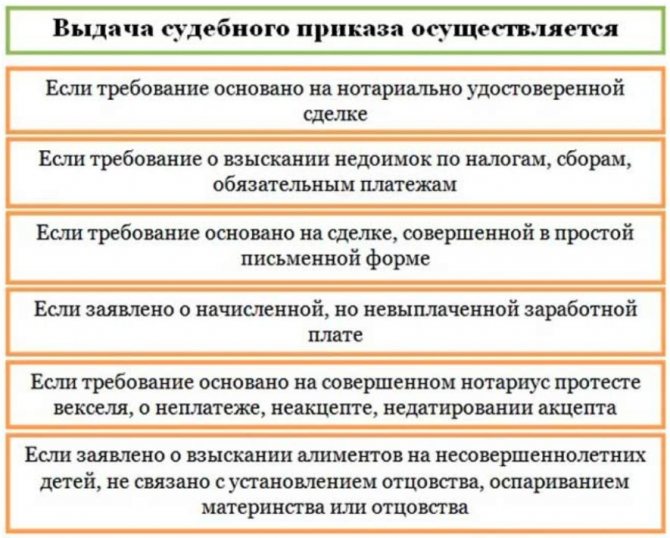
In what cases is an order issued?
Note: if you miss the 10-day deadline, even the situation of a low-income parent or a parent with many children will not help.
Debts for housing and communal services will be returned through a court order
Information project dailymoneyexpert. published an article on the collection of housing and communal services debts through a court order, with my expert commentary on the prospects for such collection:
__________
In early March, Russian President Vladimir Putin signed a federal law that introduces a simplified procedure for collecting debts for housing and communal services.
In accordance with the document, management companies will be able to combine claims against debtors for utility bills of an apartment building within the debt limit of 500 thousand rubles. These debts will be collected not through a court decision, but through a court order. A court order is issued by a magistrate alone, without summoning the debtor and the claimant, on the basis of documents submitted by the claimant and without taking into account possible objections of the debtor.
The changes take effect June 1, 2021.
Let us recall that at the end of 2015, the population’s debt to HOAs and management companies amounted to 250 billion rubles. This amount is exactly half of the annual housing and communal services budget of the entire country.
According to Sequoia Credit Consolidation, at the end of last year, the population's debt for housing and communal services increased by 15%.
Alexey Timofeev, private lawyer:
Judges usually issue restraining orders quite easily. But they really don’t like to collect penalties as part of a court order. Judicial practice has developed, according to which judges refuse to accept applications for a court order containing demands for the collection of penalties. Considering that the new law talks about debts for housing and utility services, as well as telephone communications, but there is not a word about penalties, I believe that penalties for late payment for housing and communal services (the amount of which has increased significantly since January) will be collected within the framework of a court order It won't be possible. Thus, through a court order it will be possible to recover faster, but less.
Residents do not pay utilities for various reasons. Some people agree that they should pay, but do not pay due to laziness, forgetfulness, or lack of money. Others agree with the debt, but are not going to pay and are ready to take active steps to achieve this. Still others consider the charges for housing and communal services to be unfair in whole or in part and do not pay for this reason.
A court order is indeed issued quickly and relatively easily. But it is also easily undone. Within ten days from the receipt of the court order, the debtor has the right to submit to the court objections regarding its execution, and the order will be canceled in any case. There is no need to indicate reasons for disagreement in objections. Moreover, if the debtor does not live at the place of registration or does not go to the post office, then he can receive a court order a year later, having learned about it from the bailiffs who will come for the money. And cancel it without any problems. My experience, based on dozens of court orders issued, suggests that about half of the court orders under purchase and sale agreements are canceled by the debtors, and the claimant has to go to court. Moreover, filing an application for a court order does not stop the limitation period. You may be late with your claim.
Thus, the court orders issued will be effective only against legally illiterate or inert sections of the population: lonely old people, the poor, etc. A significant part of the remaining orders will be canceled, and management companies will still have to go to court, losing both time and the state duty paid. And if we take into account the fact that it will not be possible to collect penalties through a court order, I believe that after a short surge in court orders in the housing and communal services sector, most management companies will return to litigation, which in general will be faster and more profitable than court orders. Therefore, the institution of a court order will not have a significant impact on the situation with housing and communal services debts.
Andrey Shirokov, Chairman of the RF Chamber of Commerce and Industry Committee on Entrepreneurship in the Field of Housing and Communal Services, Dean of the Faculty of Management of Large Cities at MUM:
The average payment for housing and communal services in Moscow for an apartment of 50 square meters. m is about 5 thousand rubles, including telephone, light, etc. This means that in order to accumulate a debt of 500 thousand rubles, you must not pay rent for more than 8 years. There are not many such malicious defaulters among individuals. But new ones will not be allowed to form. Management organizations have methods of influencing non-payers, ranging from turning off the lights to blocking the sewer system. And the courts. And these courts start with smaller amounts of debt. The main large defaulter is non-disconnected users, read - the state. They bear 70% of the debts in the public utilities sector. And in order to pay them off, you need to put this money into the appropriate budgets. And they are already empty. You also need to go through the lists of non-disabled users. They are formed at the level of subjects and municipalities. And these lists often include organizations affiliated with the government that are not entitled to this status. Excluding them will definitely help reduce debt.
Thus, the debt burden will not decrease significantly. Yes, new legislative innovations will somewhat simplify life for management organizations in whose houses there are a couple of people who have not paid since the adoption of the property law. That's all.
Users who cannot be disconnected will continue to be considered eternal debtors to resource-supplying organizations. Until one thing happens - a radical improvement in the country's economy. You need to understand that now the owners (individuals) are faced with a choice - pay for housing and communal services or buy food. And this choice is often made in favor of the second. This means that the owners will continue to borrow money from rent for a month or two, and then pay off the debt. The only thing that will definitely increase is the number of courts in the housing and communal services sector. And the number of individuals declared legally bankrupt is likely to increase. And the level of non-payments will only increase in the near future.
Artem Kolchin, head of the legal department for housing and communal services of HEDZ LLC:
Rather, the innovations will speed up the process of debt collection; moreover, the state duty within the framework of writ proceedings is half as much, which allows collectors not to spend large sums on mandatory duties. Also, a court order is also an executive document; there is no need to obtain a writ of execution. A court order is submitted to the bailiff service.
But there is also another side to the issue. Firstly, the courts are currently very busy, plus a large volume of applications for the issuance of court orders will be filed. Secondly, the court order can be canceled, in which case the debt collector will have to collect the debt through litigation. The court order will be canceled at the request of the debtor; accordingly, debt collection time may increase in such a situation.
The debt burden will most likely decrease, but not by much, since a court order is an executive document and must be executed. Enforcement is carried out by bailiffs, who are currently not motivated to collect debts from debtors in a timely manner.
Link to article.
__________
Help is needed? Call!
Reasons for receiving
If we talk about collecting utility debts from citizens, a court order for these obligations is issued on the basis of Art. 122 Code of Civil Procedure of the Russian Federation. One of the reasons for obtaining a simplified decision is arrears in payment for housing, utilities or communication services.
This is also important to know:
Does Sberbank have collection or seizure for debts and how to remove the seizure from the card
To obtain a court order, it is required that the amount recovered be within half a million rubles. Otherwise, you must file a claim in court, with all the ensuing consequences.
Often the question is, what is the minimum amount of debt (as well as the period of delay) that gives the right to go to court, because the Code of Civil Procedure does not give any instructions in this regard.
Theoretically, one can take as a guideline paragraph 118 of Government Decree No. 354 of May 6, 2011, dedicated to the procedure for the provision of utility services. It states that if there is a debt of at least 2 months, resource consumption may be limited.
Courts issue a court order upon documentary evidence of claims against the debtor. In this case, there should be no dispute over the amounts or period of delay. All calculations must be justified before the court.
The Arbitration Procedure Code of the Russian Federation does not directly state that a court order is issued specifically in relation to “municipal” obligations. We are talking about monetary amounts without specifying their type at all.
However, there are three main conditions:
- Total claims should not exceed 400 thousand rubles.
- The relationship between the debtor and the collector is based on a signed agreement.
- The amount of the debt is not disputed by the obligated party (there must be written confirmation of this).
If one of the above points is problematic to fulfill, the court will refuse to issue a court order. Then there is only one thing left to do - write a claim to the debtor and file a statement of claim.
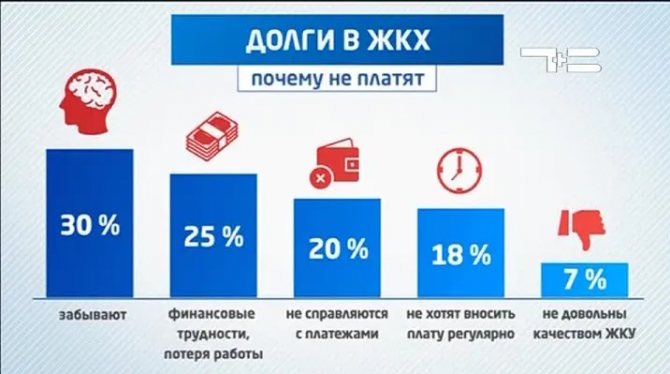
Grounds for appeal
It is desirable that the factors for appealing the court order really exist, otherwise it will be problematic to meet the deadline. Usually one or more possible options are selected.
Disagreement with the amount
The most popular solution. Sometimes the Criminal Code mistakenly indicates the amount to be paid. In some situations, it is unlawful to charge fines and penalties. If the funds specified in the order do not coincide with one’s own vision of the state of the personal account, the decision must be challenged.
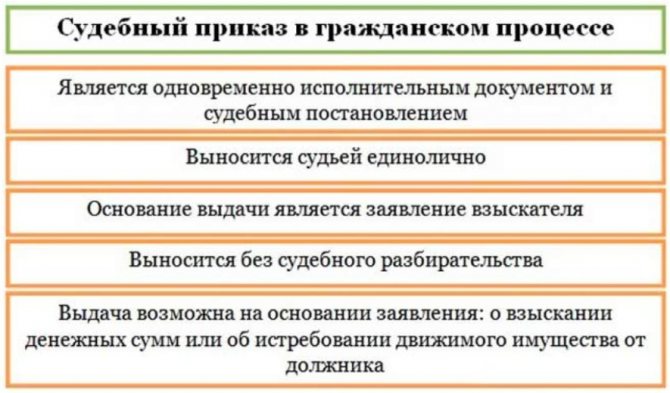
What constitutes an order in civil proceedings.
To do this, you must have receipts on hand. Experts recommend putting them in a separate folder from the very beginning so that you can present data for several years at once. The more information you can collect, the more justified your position.
Postponement
Sometimes it is not possible to repay the debt within the deadlines established by the management company, and then by the court, for good reasons. They may be the lack of registration in the region, serious illness or other unforeseen factors.
It is better to check with a lawyer about the possibility of a deferment for each case. A legal specialist will tell you what documents need to be prepared for a response to the court.
Limitation of actions
Usually, an attempt to collect old debt is a tool of unscrupulous management companies and homeowners associations. Often such lawsuits are filed to close holes in an organization's budget. A characteristic feature is that before contacting a higher authority, employees of the management company for a long time, in a persistent and aggressive manner, convince the citizen that he is obliged to pay all the arrears, threaten to turn off public services, and so on.
However, no one has canceled the limits of the claim period. When receiving a court verdict regarding old debts, you can safely appeal to this concept. According to clause 1 of Article 196 of the Civil Code of the Russian Federation, the period is three years.
Usually, as a result of consideration of an appeal from a consumer utility, the debt is frozen. They will not be able to collect it, but only until the first violation of the payment procedure. The next time you miss it, the amount will be added to the amount of the new debt. Therefore, it is better to solve the problem of the unpaid balance, request a recalculation or gradually pay off.
Order form
The executive act is drawn up in the form specified in Art. No. 124 Code of Civil Procedure of Russia. If the received copy does not correspond to them, then the decision can be successfully challenged. Most likely, this will only work once, because a simple mistake in drawing up an order will not help the debtor.
The creditor has the right to appeal again to a higher authority. At the same time, the likelihood that the verdict will again be drawn up incorrectly is minimal.
Features of filing a claim
As previously mentioned, the court considers the received application within 5 days, after which it either satisfies the requirements and issues an order, or rejects the requirements.
After the order is issued, it is transferred to the bailiffs, who monitor the debtor’s accounts and, if they exist, seize them.
In addition to the bailiffs, the order is sent to the debtor for review. In case of disagreement with the order, he has the right to send objections, which substantiate the inconsistency of the requirements of the utility service. Objections are sent no later than 10 days from the date of receipt of the order.
After objections are received, the court schedules a hearing, which is held in the usual manner, with the utility service as the plaintiff and the debtor as the defendant.
If no objections are received, then, on the basis of the order, funds are withdrawn from the debtor’s accounts to repay the debt.
Withdrawal of funds is carried out on the basis of information transmitted to the bank by the bailiff on the basis of a court order.
Note! After receiving the order, the debtor has the right to repay the existing debt within 5 days. If this right is not used, the accounts from which funds are written off will be seized.
Another right of the debtor is to receive a deferment, but for this they must provide weighty arguments (serious illness, loss of job).
A negative consequence of debt is eviction. However, in this case, the administration undertakes to provide other living quarters.
When examining the materials presented by the utility service, the court will check the application of the pre-trial procedure for resolving this issue.
Please note! The utility has only three years to go to court. After the expiration of this period, debt collection is unacceptable.

